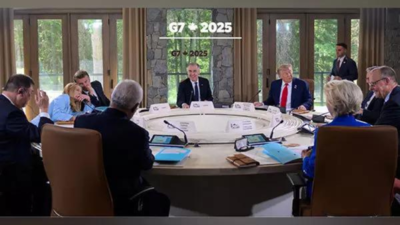Global minimum tax: G7 endorses ‘side-by-side’ system replacing top-up levies; US, UK firms exempted – Times of India

In a landmark development, the Group of Seven (G7) nations have agreed to exempt US-headquartered multinational corporations from key provisions of the global minimum tax agreement under a new “side-by-side” system. British businesses will also benefit from similar relief.As per news agency ANI, the new proposal, backed by the US and its G7 partners, will allow American firms to be taxed only domestically, on both foreign and local profits, rather than face additional top-up taxes overseas. The framework recognises existing US tax laws, specifically its domestic minimum tax, and offers a carve-out from the OECD’s Income Inclusion Rule (IIR) and Undertaxed Profits Rule (UTPR).The G7 announcement, released by Canada, which currently holds the rotating presidency, said the system was intended to “provide greater stability and certainty in the international tax system moving forward.”The breakthrough came after the United States dropped Section 899, a controversial clause in US President Donald Trump’s tax bill, which had proposed retaliatory taxes on foreign companies operating in the US. According to news agency Reuters, its removal paved the way for broader agreement and eased concerns in countries like the UK, where businesses feared exposure to punitive tax provisions.British finance minister Rachel Reeves welcomed the development and was quoted by Reuters as saying, “Today’s agreement provides much-needed certainty and stability for those businesses after they had raised their concerns.” Reeves also reaffirmed the UK’s continued efforts to combat aggressive tax avoidance globally.The move follows concerns raised earlier this year after Trump pulled the US out of the 2021 OECD-brokered global tax deal through an executive order. That landmark agreement, supported by nearly 140 countries under the Inclusive Framework, had aimed to ensure large multinational companies pay at least a 15% tax rate globally.According to news agency AFP, Trump also threatened retaliatory taxes on countries applying the global rules to US companies, a step that created apprehension among international investors.With the Section 899 provision now withdrawn, the new dual-track solution reflects a broader consensus among G7 nations to preserve tax sovereignty while maintaining progress on tackling base erosion and profit shifting (BEPS).The US Treasury said on X that this side-by-side approach would “preserve important gains made by jurisdictions inside the Inclusive Framework” and that it looks forward to developing this solution further through constructive discussions.The agreement now awaits further deliberation at the OECD level to determine how exemptions for US and UK firms will be formally recognised under the global tax regime. G7 leaders reiterated that the final solution must be “acceptable and implementable to all.”




